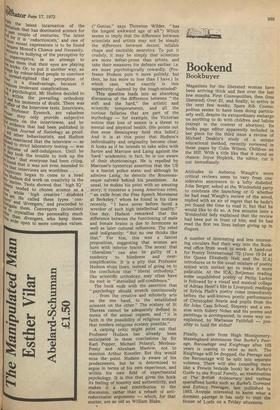Bookend
Bookbuyer
Magazines for the liberated woman have been arriving thick and fast over the last few months. First Cosmopolitan, then (less liberated) Over 21, and finally, to arrive in the next few weeks, Spare Rib. Cosmopolitan seems to have been doing particuarly well, despite its extraordinary embargo on anything to do with children and babies (except in the context of abortion). Its books page editor apparently included in her piece for the third issue a review of Michael Deakin's study of a unique educational method, recently reviewed in these pages by Colin Wilson, Children on the Hill. With a title like that it stood no chance: Joyce Hopkirk, the editor, cut it out immediately.
Attitudes to Auberon Waugh's more critical reviews seem to vary from considerable annoyance to a lofty disbelief. John Berger, asked at the Wiedenfeld party to celebrate the launching of G whether he had read Waugh's review of the novel, replied with an air of regret that he hadn't yet found the time to read it, but that he would like to do so. A few minutes later a Weidenfeld lady explained that the review had been put in front of him, and he had read the first ten lines before giving up in disgust.
A number of interesting and less interesting circulars find their way into the Bookend office from week to week. A hand-out for Poetry International '72 (June 19-24 at the Queen Elizabeth Hall and the ICA) introduces us to the usual mixture of poetry spiced with instant art to make it more palatable. At the ICA, Betjeman reading some unpublished poetry of Philip Larkin is followed by a visual and musical collage of Adrian Henri's life in Liverpool; readings of Sylvia Plath's poetry come immediately before the well-known poetic performance of Christopher Searle and pupils from the Sir John Cass School, Stepney; and a session with Sidney Nolan and his poems and paintings is accompanied, in some way unexplained, by Marianne Faithfull — possibly to hold the slides?
Finally, a note from Hugh MontgomeryMassingberd announces that Burke's Peerage, Baronetage and Knightage after 105 years is ceasing to exist as such. The Knightage will be dropped, the Peerage and the Baronetage will be split into separate volumes. There will also (sounding more like a Frewin bedside book) be a Burke's Guide to the Royal Family, an examination of The British Aristocracy and various specialised books such as Burke's Dormant and Extinct Peerages, last published in 1883. Anyone interested to know what a dormant peerage is has only to visit the House of Lords on a Friday afternoon.










































 Previous page
Previous page